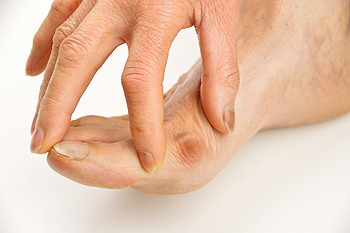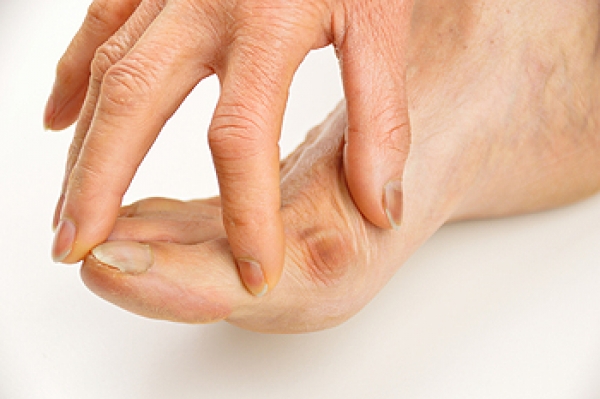 The bottom and side of the big toe is generally the location where a bunion develops. It is considered to be a deformity and can appear for a variety of reasons. These can include genetic factors, and wearing shoes that do not have enough room for the toes to move freely in. Additionally, existing medical conditions such as gout or rheumatoid arthritis may cause a bunion to develop. If the bunion is mild relief may be found when orthotics are worn, or when the bunion is covered with a protective pad. Severe bunions may require surgery to correct them permanently. If you notice signs of a small bump on the side of the big toe, please confer with a podiatrist as quickly as possible. Early treatment can slow down or stop a bunion's progression.
The bottom and side of the big toe is generally the location where a bunion develops. It is considered to be a deformity and can appear for a variety of reasons. These can include genetic factors, and wearing shoes that do not have enough room for the toes to move freely in. Additionally, existing medical conditions such as gout or rheumatoid arthritis may cause a bunion to develop. If the bunion is mild relief may be found when orthotics are worn, or when the bunion is covered with a protective pad. Severe bunions may require surgery to correct them permanently. If you notice signs of a small bump on the side of the big toe, please confer with a podiatrist as quickly as possible. Early treatment can slow down or stop a bunion's progression.
If you are suffering from bunion pain, contact Dr. Joshua David Scoll of Pennsylvania. Our doctor can provide the care you need to keep you pain-free and on your feet.
What Is a Bunion?
Bunions are painful bony bumps that usually develop on the inside of the foot at the joint of the big toe. As the deformity increases over time, it may become painful to walk and wear shoes. Women are more likely to exacerbate existing bunions since they often wear tight, narrow shoes that shift their toes together. Bunion pain can be relieved by wearing wider shoes with enough room for the toes.
Causes
- Genetics – some people inherit feet that are more prone to bunion development
- Inflammatory Conditions - rheumatoid arthritis and polio may cause bunion development
Symptoms
- Redness and inflammation
- Pain and tenderness
- Callus or corns on the bump
- Restricted motion in the big toe
In order to diagnose your bunion, your podiatrist may ask about your medical history, symptoms, and general health. Your doctor might also order an x-ray to take a closer look at your feet. Nonsurgical treatment options include orthotics, padding, icing, changes in footwear, and medication. If nonsurgical treatments don’t alleviate your bunion pain, surgery may be necessary.
If you have any questions, please feel free to contact one of our offices located in Philadelphia, Bensalem, and Fairless Hills, PA . We offer the newest diagnostic and treatment technologies for all your foot care needs.

